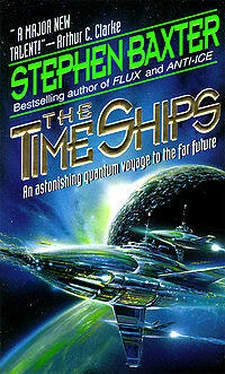Britain was already an island, in this Palaeocene, but compared to its configuration in the nineteenth century, its north-west corner was tipped up to a greater altitude. The Irish Sea had yet to form, so that Britain and Ireland formed a single landmass; but the south-east of England was immersed beneath the Sea whose margins we inhabited. My Palaeocene Sea was an extension of the North Sea; if we could have made a boat, we could have traveled across the English Channel and sailed into the heart of France through the Aquitaine Basin, a tongue of water which connected in turn to the Tethys Sea — a great ocean swamping the Mediterranean countries.
With the coming of night, the Morlock emerged from a deeper shade in the forest. He stretched working his muscles more as a cat will than a human — and he massaged his injured leg. Then he spent some minutes on finger-combing the hair on his face, chest and back.
At length he came hobbling over to me; the purple light of the sunset glinted from his starred and cracked goggles. He fetched me more water, and with my mouth moistened, I whispered, “How long?”
“Three days.”
I had to suppress a shudder at the sound of his queer, liquid voice. You might have thought I would be used to Morlocks by now; but after three days spent lying helpless, it came as something of a shock to be reminded that I was isolated in this hostile world, save only for this alien of the far future!
Nebogipfel made me some chowder. By the time I had eaten, the sunset was gone, and the only illumination came from a sliver of young moon which hung low in the sky. Nebogipfel had discarded his goggles, and I could see his huge, gray-red eye, hovering like the moon’s translucent shadow in the dark of the hut.
“What I want to know is,” I said, “what made me ill?”
“I am not certain.”
“Not certain?” I was surprised at this unusual admission of limitation, for Nebogipfel’s breadth and depth of knowledge were extraordinary. I pictured the mind of a nineteenth-century man as something analogous to my old workshop: full of information, but stored in a quite haphazard way, with open books and scraps of notes and sketches scattered over every flat surface. By comparison with this jumble, the mind of a Morlock — thanks to the advanced educational techniques of the Year 657,208 — was ordered like the contents of a fine encyclopedia, with the books of experience and learning indexed and shelved. All this raised the practical level of intelligence and knowledge to heights undreamed of by men of my time. “Still,” he said, “we should not be surprised at the fact of illness. I am, in fact, surprised you have not succumbed earlier.”
“What do you mean?”
He turned to me. “ That you are a man out of your time.”
In a flash, I understood what he meant.
The germs of disease have taken toll of Humanity since the beginning — indeed, were cutting down the prehuman ancestors of man even in this ancient Age. But because of this grim winnowing of our kind we have developed resisting power. Our bodies struggle against all germs, and are altogether immune to some.
I pictured all those human generations which still lay ahead of this deep Age, those firefly human souls which would flicker in the darkness like sparks, before being extinguished forever! But those tiny struggles would not be in vain, for — by this toll of a billion deaths — man would buy his birthright of the earth.
It was different for the Morlock. By Nebogipfel’s century, there was little left of the archetypal human form. Everything in the Morlock’s body — bones, flesh, lungs, liver — had been adjusted by machinery to permit, Nebogipfel said, an ideal balance between longevity and richness of life. Nebogipfel could be wounded, as I had seen, but — according to him — his body was no more likely to catch a germ infection than was a suit of armor. And indeed, I had detected no signs of infection about his injured leg, or his eye. The original world of Eloi and Morlock had devised a different solution, I remembered, for I had seen no disease or infection there either, and little decay, and I had surmised that that was a world cleansed of harmful bacteria.
I, however, had no such protection.
After my first brush with illness, Nebogipfel turned his attention to more subtle aspects of our survival needs. He sent me foraging for supplements for our diet, including nuts, tubers, fruit, and edible fungi, all of which were added to our staples of sea food and the flesh of those animals and birds stupid enough to allow themselves to be entrapped by my clumsy hunting with slings and stones. Nebogipfel also attempted to derive simple medicines: poultices, herbal teas, and the like.
My illness filled me with a deep and abiding gloom, for this was a danger of time travel which had not occurred to me before. I shivered, and wrapped my arms around my still feeble body. My strength and intelligence could beat off Diatryma, and other massive natives of the Palaeocene, but they would offer me no defense against the predations of the invisible monsters borne by air, water and flesh.
Perhaps if I had had some experience of Tropical conditions before our stranding in the Palaeocene, I might have been prepared for the Storm.
The day had been heavy and more humid than usual, and the air near the Sea had that odd, light-impregnated quality one associates with a forthcoming change of weather. That evening, exhausted by my labors and uncomfortable, I was glad to fall into my pallet; at first, though, the heat was so great that sleep was slow to come.
I was woken by a slow patter of raindrops falling onto our loose roof of palm fronds. I could hear the rain coming down into the forest behind us — bullets of water hammering against the leaves — and pounding into the sand of the beach. I could not hear, or see, Nebogipfel; it was the darkest part of the night.
And then the Storm fell on us.
It was as if some lid had been opened up in the sky; gallons of rainwater came hurtling down, pushing in our palm-frond roof in a moment. The wreckage of our flimsy hut clattered down around me, and I was drenched to the skin; I was still on my back, and lay staring up into the rod-like paths of the raindrops, which receded into a cloud-obscured heaven.
I struggled to get up, but soaked roof-fronds impeded me, and my pallet turned into a muddy swamp. Soon I was coated in mud and filth, and with the water hammering at my scalp and trickling into my eyes, I was all but blind.
By the time I reached my feet, I was dismayed at the alacrity with which our shelter was collapsing; all its struts had fallen, or were leaning crazily. I could make out the boxy structure of Nebogipfel’s reconstructed time-device, but it was already all but buried by bits of the hut.
I cast about in that sodden, slippery wreckage, dragging away fronds and bits of cloth. I found Nebogipfel: he looked like an oversize rat, with his hair plastered against his body and his knees tucked up against his chest. He had lost his goggles and was quivering, quite helpless. I was relieved to find him so easily; for the night was his normal time of operation, and he might have been anywhere within a mile or so of the hut.
I bent to scoop him up, but he turned to face me, his ruined eye a pit of darkness. “The Time-Car! We must save the Time-Car!” His liquid voice was almost inaudible against the Storm. I reached for him again, but, feebly, he struggled away from me.
With the raindrops hammering against my scalp, I growled in protest; but, gamely, I waded through the litter of our home to Nebogipfel’s device. I hauled great handfuls of fronds from it, but found the framework embedded in a deepening mud, all tangled up with clothes and cups and the remnants of our attempts at furniture. I took hold of the frame’s uprights and tried to haul the whole thing free of the mud by main force, but succeeded only in bending the shape of the frame, and then in snapping open its corners.
Читать дальше
Конец ознакомительного отрывка
Купить книгу









